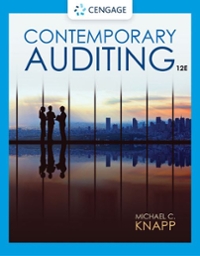Andrea Jung earned a degree in English literature from Princeton in 1979. Before pursuing a law degree,
Question:
Andrea Jung earned a degree in English literature from Princeton in 1979. Before pursuing a law degree, the 20-year-old Jung decided to take a short break from academics to gain some real-world experience. During a college career fair, Jung landed a job as a management trainee with Bloomingdale's, an upscale New York-based retailer. Jung soon became fascinated by the retail industry and decided to forego law school.
During the first few years of her career, Jung earned a reputation as a marketing savant, which allowed her to move rapidly up Bloomingdale's employment hierarchy.
After leaving Bloomingdale's in 1985, Jung accepted a series of progressively higherranking marketing positions with other major retailers. In 1994, Jung left Neiman Marcus to become the president of Avon's U.S. product marketing group, a position she held for two years before being promoted to president of global marketing for the company. In 1999, Avon's board chose Jung to serve as CEO after a dismal earnings report caused a sharp drop in the company's stock price.
The new CEO quickly energized Avon. During the first two quarters that Jung oversaw the company, its sales increased by nearly 10 percent while its earnings leaped by 40 percent. Those impressive results would be overshadowed by the company's performance over her first five years as CEO. Over that time frame, Avon's net income and stock price each increased nearly 300 percent. Jung would eventually become the longest-serving female CEO of a Fortune 500 firm, remain a permanent fixture on the "most powerful" women in business rankings, and be widely recognized as the most prominent Chinese-American in the U.S. business world.
A series of bold initiatives launched by Jung were responsible for the company's quick turnaround after she was promoted to CEO. One of those initiatives was giving Avon a sleeker, more "hip" image to attract younger women to its products. That strategy included introducing a line of products specifically designed for women in their 20s and hiring prominent young women to serve as company spokesmodels, such as Academy Award-winning actress Reese Witherspoon and sports celebrities Serena and Venus Williams.
Another strategic measure Jung implemented was expanding Avon's international operations. The new CEO placed particular emphasis on extending Avon's presence in such large and potentially lucrative markets as China, India, Russia, and Latin America. She took a personal interest in Avon Products China (APC), the company's largest operating unit in its Asia-Pacific sales region.
Jung, whose parents had emigrated to the United States from China via Canada, was asked during an interview why she focused so much time and energy on developing the Chinese market for Avon's products. "It's a huge opportunity, not just to sell our products but to do this . . . by teaching women to be self-sufficient and economically independent. Nowhere is this more important than in China."2 The Chinese subsidiary was so important to Jung that she required its top official to report directly to her.
Questions
1. The improper payments made by APC occurred during the time frame that Andrea Jung served as Avon’s CEO. Was she “responsible” for those payments, even if she was unaware of them? Why or why not?
2. Identify the role and responsibilities that an internal audit staff typically assumes in a company’s internal control system.
3. The IMA Statement of Ethical Professional Practice identifies four ethical standards, three of which are competence, confidentiality, and integrity (see “Ethics Center” on IMA website). Relying on those three ethical standards, evaluate the conduct of Avon’s internal audit staff during the company’s initial investigation of the questionable payments made by APC.
4. Do you agree with Avon’s corporate legal staff that the potential FCPA violations were a legal issue and not an internal audit issue? Explain.
5. The COSO (“Committee on Sponsoring Organizations of the Treadway Commission”) internal control framework identifies five components of an entity’s internal control. Which, if any, of those five components of Avon’s internal control were flawed? Explain. If there were multiple flaws in Avon’s internal control, identify which one you believe was most serious and defend your choice.
6. Avon’s independent audit firm did not report any material weaknesses in Avon’s internal control during the course of the FCPA scandal. Define a “material weakness” in internal control and explain whether or not you believe Avon had one or more material weaknesses in internal control during the course of the FCPA scandal.
7. If the citizens of certain foreign countries believe that the payment of bribes is an acceptable business practice, is it appropriate for U.S. companies to challenge that belief when doing business in those countries? Defend your answer.
Step by Step Answer:






